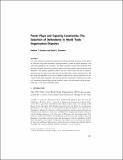| dc.contributor.author | Guzman, Andrew | |
| dc.contributor.author | Simmons, Beth | |
| dc.date.accessioned | 2009-07-08T13:55:43Z | |
| dc.date.issued | 2005 | |
| dc.identifier.citation | Guzman, Andrew T., and Beth A. Simmons. 2005. Power plays and capacity constraints: the selection of defendants in world trade organization disputes. Journal of Legal Studies 34, no. 2: 557-598. | en |
| dc.identifier.issn | 0047-2530 | en |
| dc.identifier.uri | http://nrs.harvard.edu/urn-3:HUL.InstRepos:3153319 | |
| dc.description.abstract | This paper examines the relationship between the wealth and power of states and their ability to participate fully within the World Trade Organization’s system of dispute resolution. Two alternative hypotheses are considered. The power hypothesis predicts that politically weak countries will refrain from filing complaints against politically powerful states for fear of costly retaliation. The capacity hypothesis predicts that low-income states will tend to complain about behavior by high-income states because the latter offer a higher expected return. We test these two hypotheses and find considerable support for the capacity hypothesis and no support for the power hypothesis. We conclude that poor states behave differently than their rich counterparts because they lack the financial, human, and institutional capital to participate fully in the dispute resolution system. | en |
| dc.description.sponsorship | Government | en |
| dc.language.iso | en_US | en |
| dc.publisher | University of Chicago Press | en |
| dc.relation.isversionof | http://dx.doi.org/10.1086/430767 | en |
| dash.license | LAA | |
| dc.title | Power Plays and Capacity Constraints: The Selection of Defendants in World Trade Organization Disputes | en |
| dc.relation.journal | Journal of Legal Studies | en |
| dash.depositing.author | Simmons, Beth | |
| dc.identifier.doi | 10.1086/430767 | * |
| dash.contributor.affiliated | Simmons, Beth | |
| dc.identifier.orcid | 0000-0001-8207-713X | |


